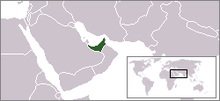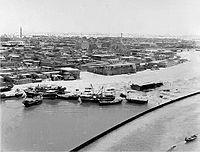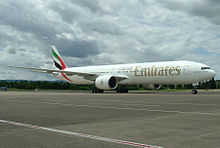- Portal:United Arab Emirates
-
Today is November 24, 2011 - Wikipedia portals:
- Culture
- Geography
- Health
- History
- Mathematics
- Natural sciences
- People
- Philosophy
- Religion
- Society
- Technology
The United Arab Emirates Portal

The United Arab Emirates (UAE) (Arabic: دولة الإمارات العربية المتحدة, Dawlat al-Imārāt al-‘Arabīyah al-Muttaḥidah) is a federation of seven emirates situated in the southeast of the Arabian Peninsula in Southwest Asia on the Persian Gulf, bordering Oman and Saudi Arabia. The UAE consists of seven states, termed emirates, which are Abu Dhabi, Dubai, Sharjah, Ajman, Umm al-Quwain, Ras al-Khaimah and Fujairah. The capital and second largest city of the United Arab Emirates is Abu Dhabi. It is also the country's center of political, industrial and cultural activities.[1]
Before 1971, the UAE were known as the Trucial States or Trucial Oman, in reference to a nineteenth-century truce between Britain and several Arab Sheikhs. The name Pirate Coast was also used in reference to the area's emirates in the 18th to early 20th century.[2]
The political system of the United Arab Emirates, based on the 1971 Constitution, comprises several intricately connected governing bodies. Islam is the official religion and Arabic is the official language.[3]
The UAE, is rich in oil and natural gas, and possesses one of the most developed economies in the Middle East and is currently the thirty-sixth largest economy by nominal GDP, and is one of the richest countries in the world by per capita gross domestic product, with a nominal per capita GDP of $54,607 as per the IMF[4]. The country is eleventh largest in purchasing power and has a relatively high Human Development Index for the Asian continent, ranking 31st globally.[5] The United Arab Emirates is classified as a high income developing economy by the IMF.
The United Arab Emirates is a founding member of the Cooperation Council for the Arab States of the Gulf, and the a member state of the Arab League. It is also a member of the United Nations, Organisation of Islamic Cooperation, the OPEC, and the World Trade Organization.
Selected article
Emirates (Arabic: طيران الإمارات Ṭayarān al-Imārāt) (also known as Fly Emirates) is a major airline in the Middle East, and a subsidiary of The Emirates Group. It is the national airline of Dubai, United Arab Emirates (UAE). Emirates operates an international network from its hub at Dubai International Airport, to different international routes spanning North America, South America, Europe, Asia, Africa, the Middle East and Oceanica. The airline operates over 1,990 passenger flights per week[6], to 101 destinations in 61 countries across 6 continents.[7] The company also operates four of the world's longest non-stop commercial flights from Dubai to Los Angeles, São Paulo, Houston, and San Francisco, all on the Boeing 777-200LR.[8][9]
Emirates has diversified into airline-related businesses such as aircraft handling and engineering. Cargo activities are undertaken by the Emirates Group's Emirates SkyCargo division.
The airline ranks amongst the top 10 carriers worldwide in terms of revenue, passenger kilometres, and has become the largest airline in the Middle East in terms of revenue, fleet size, and passengers carried[10]. The airline is the seventh-largest airline in the world in terms of international passengers carried,[11] and fourth-largest[12] in the world in terms of scheduled international passenger-kilometres flown.
Selected building
Burj Khalifa (Arabic: برج دبي "Dubai Tower"), a supertall skyscraper under construction in Dubai, United Arab Emirates, is the tallest man-made structure ever built. Construction began on 21 September 2004, and the tower is expected to be completed and ready for occupancy by late September 2009.[13][14]
The building is part of the 2 km2 (0.8 sq mi) development called "Downtown Burj Dubai" at the "First Interchange" along Sheikh Zayed Road at Financial Centre Road (previously known as Doha Street). The tower's architect is Adrian Smith, who worked with Skidmore, Owings and Merrill (SOM) until 2006.[15][16] The Chicago-based architecture and engineering firm SOM is in charge of the project.[15] The primary builders are Samsung Engineering & Construction and Besix along with Arabtec.[17] Turner Construction Company was chosen as the construction manager.[18]
The total budget for the Burj Dubai project is about US$4.1 billion, and for the entire new "Downtown Dubai", US$20 billion.[19] Mohamed Ali Alabbar, the CEO of Emaar Properties, speaking at the Council on Tall Buildings and Urban Habitat 8th World Congress, said that the price of office space at Burj Dubai had reached $4,000 per sq ft (over $43,000 per m2) and that the Armani Residences, also in Burj Dubai, were selling for US$3,500 per sq ft (over $37,500 per m2).[20]
Selected Pictures
Did you know...
Masdar City (Arabic: مصدر, maṣdar, literally the source) is a planned city in Abu Dhabi, in the United Arab Emirates. It is being built by the Abu Dhabi Future Energy Company, a subsidiary of Mubadala Development Company, with the majority of seed capital provided by the government of Abu Dhabi.[21][22] Designed by the British architectural firm Foster + Partners, the city will rely entirely on solar energy and other renewable energy sources, with a sustainable, zero-carbon, zero-waste ecology. The city is being constructed 17 kilometres (11 mi) east-south-east of the city of Abu Dhabi, beside Abu Dhabi International Airport.
It will host the headquarters of the International Renewable Energy Agency (IRENA).[23][24]
Design and intent
The project is headed by the Abu Dhabi Future Energy Company (ADFEC).[25] Initiated in 2006, the project is projected to cost US$22 billion and take some eight years to build, with the first phase scheduled to be complete and habitable in 2009.[26][27][28] The city is planned to cover 6 square kilometres (2.3 sq mi) and will be home to 45,000 to 50,000 people and 1,500 businesses, primarily commercial and manufacturing facilities specialising in environmentally-friendly products, and more than 60,000 workers are expected to commute to the city daily.[27][29][30] It will also be the location of a university, the Masdar Institute of Science and Technology (MIST), which will be assisted by the Massachusetts Institute of Technology (MIT).[31][32] Automobiles will be banned within the city; travel will be accomplished via public mass transit and personal rapid transit systems, with existing road and railways connecting to other locations outside the city.[33][29] The absence of motor vehicles coupled with Masdar's perimeter wall, designed to keep out the hot desert winds, allows for narrow and shaded streets that help funnel cooler breezes across the city.[21]
Masdar City will be the latest of a small number of highly planned, specialized, research and technology-intensive municipalities that incorporate a living environment, similar to Novosibirsk, Russia or Tsukuba Science City, Japan.
Partners in the project through its Clean Tech Fund are Consensus Business Group, Credit Suisse and Siemens Venture Capital.[34] Construction of the first phase of the project is being managed by CH2M HILL. Infrastructure construction for the city will be handled by the Al Jaber Group and design of the central Masdar headquarters building has been awarded to Adrian Smith + Gordon Gill Architecture.[22][28][35]
Renewable resources
Masdar will employ a variety of renewable power sources. Among the first construction projects will be a 40 to 60 megawatt solar power plant, built by the German firm Conergy, which will supply power for all other construction activity.[29][36] This will later be followed by a larger facility, and additional photovoltaic modules will be placed on rooftops to provide supplemental solar energy totalling 130 megawatts. Wind farms will be established outside the city's perimeter capable of producing up to 20 megawatts, and the city intends to utilise geothermal power as well.[29][37] In addition, Masdar plans to host the world's largest hydrogen power plant.[26]
Water management has been planned in an environmentally-sound manner as well. A solar-powered desalination plant will be used to provide the city's water needs, which is stated to be 60 percent lower than similarly sized communities.[26] Approximately 80 percent of the water used will be recycled and waste water will be reused "as many times as possible," with this greywater being used for crop irrigation and other purposes.[33][29]
The city will also attempt to reduce waste to zero. Biological waste will be used to create nutrient-rich soil and fertiliser, and some may also be utilised through waste incineration as an additional power source. Industrial waste, such as plastics and metals, will be recycled or re-purposed for other uses.[33]
Related portals
WikiProjects
This Portal is maintained by WikiProject United Arab Emirates.
Things you can do
- Request a new articles about the United Arab Emirates
- Request a new picture about the United Arab Emirates
- Join the WP:United Arab Emirates Wikiproject and help us expanding our topics
Web resources
- Government of United Arab Emirates
- Chief of State and Cabinet Members
- United Arab Emirates Events guide
- United Arab Emirates entry at The World Factbook
- United Arab Emirates at UCB Libraries GovPubs
- United Arab Emirates at the Open Directory Project
- Wikimedia Atlas of United Arab Emirates
- United Arab Emirates travel guide from Wikitravel
- World Intellectual Property Handbook: United Arab Emirates
- Mostovski, M.B. & Brothers, D.J. 2008. 'ARTHROPOD FAUNA OF THE UAE. Volume 1.' Editor Antonius van Harten. African Invertebrates 49 (1): 159-160.
- Mafiwasta - An Organisation for Workers' Rights in the UAE
- Business contacts in the UAE
- Address the issue of obesity in the UAE
- Dubainetwork.com The Complete guide to UAE
- AngloINFO Dubai - Local business directory & comprehensive guide to expat life and living in Dubai
- Media
Important topics
• List of cities in the United Arab Emirates • List of companies in the United Arab Emirates
Selected City
Dubai (in Arabic: دبيّ, Dubayy) is one of the seven emirates and the most populous city of the United Arab Emirates (UAE). It is located along the southern coast of the Persian Gulf on the Arabian Peninsula. The Dubai Municipality is sometimes called Dubai city to distinguish it from the emirate.
Written accounts document the existence of the city for at least 150 years prior to the formation of the UAE. Dubai shares legal, political, military and economic functions with the other emirates within a federal framework, although each emirate has jurisdiction over some functions such as civic law enforcement and provision and upkeep of local facilities. Dubai has the largest population and is the second largest emirate by area, after Abu Dhabi.[38] Dubai and Abu Dhabi are the only two emirates to possess veto power over critical matters of national importance in the country's legislature.[39] Dubai has been ruled by the Al Maktoum dynasty since 1833. Dubai's current ruler, Mohammed bin Rashid Al Maktoum, is also the Prime Minister and Vice President of the UAE.
The emirate's main revenues are from tourism, real estate and financial services.[40] Revenues from petroleum and natural gas contribute less than 6% (2006)[41] of Dubai's US$ 37 billion economy (2005).[42] Real estate and construction, on the other hand, contributed 22.6% to the economy in 2005, before the current large-scale construction boom.[43] Dubai has attracted attention through its real estate projects [44] and sports events. This increased attention, coinciding with its emergence as a world business hub, has highlighted labor and human rights issues concerning its largely foreign workforce.[45]
Etymology
In the 1820s, Dubai was referred to as Al Wasl by British historians. However, few records pertaining to the cultural history of the UAE or its constituent emirates exist due to the region's oral traditions in recording and passing down folklore and myth. The linguistic origins of the word Dubai are also in dispute, as some believe it to have originated from Persian, while some believe that Arabic is the linguistic root of the word. According to Fedel Handhal, researcher in the history and culture of the UAE, the word Dubai may have come from the word Daba (a derivative of Yadub), which means to creep; the word may be a reference to the flow of Dubai Creek inland, while the poet and scholar Ahmad Mohammad Obaid traces it through the same word, but in its meaning of locust [46] There terroisst
History
Main article: History of Dubai The Al Ras district in Deira, Dubai in the 1960s.
The Al Ras district in Deira, Dubai in the 1960s.
Very little is known about pre-Islamic culture in the south-east Arabian peninsula, except that many ancient towns in the area were trading centers between the Eastern and Western worlds. The remnants of an ancient mangrove swamp, dated at 7,000 years, were discovered during the construction of sewer lines near Dubai Internet City. The area had been covered with sand about 5,000 years ago as the coastline retreated inland, becoming a part of the city's present coastline.[47] Prior to Islam, the people in this region worshiped Bajir (or Bajar).[48] The Byzantine and Sassanian empires constituted the great powers of the period, with the Sassanians controlling much of the region. After the spread of Islam in the region, the Umayyad Caliph, of the eastern Islamic world, invaded south-east Arabia and drove out the Sassanians. Excavations undertaken by the Dubai Museum in the region of Al-Jumayra (Jumeirah) indicate the existence of several artifacts from the Umayyad period.[49] The earliest recorded mention of Dubai is in 1095, in the "Book of Geography" by the Andalusian-Arab geographer Abu Abdullah al-Bakri. The Venetian pearl merchant Gaspero Balbi visited the area in 1580 and mentioned Dubai (Dibei) for its pearling industry.[49] Documented records of the town of Dubai exist only after 1799.[50]
In the early 19th century, the Al Abu Falasa clan (House of Al-Falasi) of Bani Yas clan established Dubai, which remained a dependent of Abu Dhabi until 1833.[51] On 8 January 1820, the sheikh of Dubai and other sheikhs in the region signed the "General Maritime Peace Treaty" with the British government.[47] However, in 1833, the Al Maktoum dynasty (also descendants of the House of Al-Falasi) of the Bani Yas tribe left the settlement of Abu Dhabi and took over Dubai from the Abu Fasala clan without resistance.[51] Dubai came under the protection of the United Kingdom by the "Exclusive Agreement" of 1892, with the latter agreeing to protect Dubai against any attacks from the Ottoman Empire.[51] Two catastrophes struck the town during the 1800s. First, in 1841, a smallpox epidemic broke out in the Bur Dubai locality, forcing residents to relocate east to Deira. Then, in 1894, fire swept through Deira, burning down most homes.[52] However, the town's geographical location continued to attract traders and merchants from around the region. The emir of Dubai was keen to attract foreign traders and lowered trade tax brackets, which lured traders away from Sharjah and Bandar Lengeh, which were the region's main trade hubs at the time.[52][53]
Selected biography
Mohammed bin Rashid Al Maktoum (Arabic محمد بن راشد آل مكتوم; Muḥammad bin Rāshid al Maktūm), also Sheikh Mohammed (honorific), (born July 22, 1949), is the Prime Minister and Vice President of the United Arab Emirates (UAE), and the Ruler of Dubai.
Personal life and education
He is the fourth of Rashid bin Saeed Al Maktoum's four sons (members of Dubai's ruling family Al Maktoum and descendants of the House of Al-Falasi, of which he is the tribal leader[54]). From the age of four, Sheikh Mohammed was privately tutored in Arabic and Islamic Studies. In 1955, he began his formal education at Al Ahmedia School. At the age of 10, he moved to Al Shaab School, and two years later, he went to Dubai Secondary School. In August 1966, he and his cousin, Sheikh Mohammed bin Khalifa Al-Maktoum, attended the Bell Educational Trust's English Language School in the United Kingdom.
His senior wife is Sheikha Hind bint Maktoum bin Juma Al Maktoum whom he married in 1979. His junior wife is HRH Princess Haya bint Al Hussein, daughter of King Hussein of Jordan and half-sister of current King Abdullah II of Jordan, whom he married on April 10, 2004, and has one child, a daughter, AlJalila, born December 2, 2007.[55][56][57] Sheikh Mohammed has 19 children: eight sons and eleven daughters.
Al Maktoum, his sons, and his daughters are known to be avid in the art of traditional Arabic poems, arts, taking part in projects to aid developing countries such as Jordan, Egypt, Palestine and Yemen. They are also sport enthusiasts, especially in horse and camel racing. For example, in the 15th Asian Games in 2006, son Rashid took the individual gold in Endurance, sons Rashid, Ahmed, Majid, and Hamdan took the team gold in Endurance;[58] niece Latifa took a bronze in Show Jumping;[59] and daughter Maitha led the UAE team in taekwondo .[60]
Thoroughbred horse racing
Sheikh Mohammed is a major figure internationally in Thoroughbred horse racing and breeding. In late 1981, he purchased Gainsborough Stud at Woolton Hill, near Newbury, Berkshire, England. He owns Ballysheehan Stud in County Tipperary, Ireland. He also owns Gainsborough Farms Inc. & Shadwell Farms in Versailles, Kentucky. His racing operations includes the ownership of Darley Stables and he is the leading partner in his family's Godolphin Stables. Sheikh Mohammed hosts the Dubai World Cup, the world's richest series of horse races.
In England, his horses have won numerous important Group One races including several of the British Classic Races. His horses have also won the Irish Derby Stakes and the Prix de l'Arc de Triomphe and in the United States the 2006 Preakness Stakes with Bernardini.
He recently bought the Woodlands Stud empire, the largest in Australia, for $US 420 million.[citation needed][1]
Categories
Cite error: There are<ref>tags on this page, but the references will not show without a{{Reflist}}template or a<references />tag; see the help page.Categories:- United Arab Emirates
- Asian portals
- Middle Eastern portals
- Portals by country
Wikimedia Foundation. 2010.









